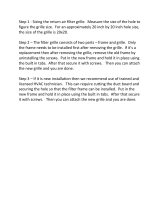
4
3. Have a qualified serviceman inspect all
furnace components and field wiring and
clean and service heating system as
needed. If this furnace was installed with
aluminum power supply wiring, have ser-
viceman periodically check all connections
to prevent possible equipment failure and/
or fire hazard. Do not attempt any service
function yourself which requires opening
furnace control panel covers.
BEFORE YOU CALL A SERVICEMAN
1. Make sure thermostat temperature selec-
tor is set above room temperature for heat-
ing or below room temperature for cooling.
If thermostat is equipped with heating/cool-
ing sub-base, make sure system switch
(see Figure 1) is set to “HEAT” for furnace
operation or set to “COOL” for optional air-
conditioning operation.
2. Check main household service panel to
see if appropriate circuit disconnect(s) for
appliance power supply is on.
3. Refer to instructions under Before Operat-
ing System for pre-operation checks.
4. Refer to instructions under Before Each
Heating Season for maintenance proce-
dures and recommended service checks.
5. Refer to owner’s manual provided with
optional air conditioner or heat pump (if
installed) for service and maintenance.
NOTE: All servicing of this heating appliance
other than the normal maintenance described in
this section must be done by authorized trained
service personnel. Do not open the control
panels (see Figure 1) at any time.
Please specify the complete model and serial
numbers shown on the furnace data label (see
Figure 1) for all warranty service and when
ordering replacement parts or optional equip-
ment. Refer to the replacement parts list pro-
vided with the furnace for part numbers.
OPTIONAL AIR CONDITIONER
AND HEAT PUMP
Your E2 Series electric furnace is approved for
use with an optional central air conditioner or a
heat pump. To adapt this heating appliance to
a “total comfort system,” contact your nearest
NORDYNE distributor.
Optional air conditioners and heat pumps are
listed by Underwriters’ Laboratories (UL) or
Environmental Testing Laboratories (ETL) and
certified by ARI and the Canadian Standards
Association (CSA), or Warnock Hersey or ETLC.
These cooling systems include energy-saving
components to provide maximum cooling per-
formance at electrical energy usage levels es-
tablished by federal standards. Refer to the
operation instruction label on your furnace for
the optional air conditioning equipment approved
for your heating appliance.
SECTION 2.
INSTALLER INFORMATION
GENERAL
These instructions and specifications are pri-
marily intended to assist qualified individuals
experienced in the proper installation of home
heating and air conditioning appliances. Some
local codes require licensed personnel for the
installation and service of this type of equip-
ment. Approved installation, operation, and
maintenance of this central heating system
appliance must be in accordance with the listed
specifications contained in these instructions
and other documents supplied with the furnace
and/or optional air conditioning equipment. Refer
to local authorities having jurisdiction for further
information.
Before beginning installation, read these in-
structions thoroughly. Follow all warnings and
cautions in the instructions and on the unit.
Improper installation, service adjustment, or
maintenance can cause explosion, fire, electri-
cal shock or other conditions which may result in
personal injury or property damage. Unless
otherwise noted in these instructions, use only
factory-authorized kits and accessories when
modifying this product.
Overview of E2 Furnace
E2E(-) Series electric furnaces are available in
two models. E2EH models are equipped with
the standard two-speed blower. E2EH models
can be easily converted for use with NORDYNE
split-system air conditioners and heat pumps.
E2EB models are air-conditioning ready; that is,
they are equipped with a multi-speed (four-
speed) blower, blower relay, and cabinet insu-
lation kit. See Table 3 for cooling and heat pump
availability with factory installed blower.




















